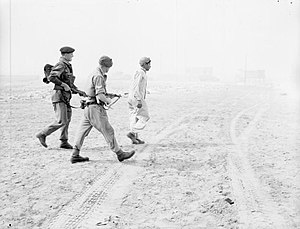Qusayr Emergency: Difference between revisions
No edit summary |
No edit summary |
||
| Line 28: | Line 28: | ||
}} | }} | ||
The '''Qusayri Emergency''', also known as the '''Revolution of Dignity''' (ثورة الكرامة), or the ''' | The '''Qusayri Emergency''', also known as the '''Revolution of Dignity''' (ثورة الكرامة), or the '''Anti-Colonial Struggle''' (النضال ضد الاستعمار), was an armed rebelion in the [[Crown Colony of Qusayr]] by {{wp|Arab People|Khatti}} locals and the !British Colonial State in Qusayr. | ||
The conflict is traditionally consitered to have started when members of the [[3rd Royal Parachute Brigade]] executed 18 year old [[Saadallah al-Ashari]] while quelling a riot in the [[Khatti Quarter]]. His killing was photographed by [[Edward Fidaki]] and the image of his death led to the [[Qusayri General Strike]]. A {{wp|State of Emergency}} was declared by Governor [[William Henry Phayre]] in 1949. The conflict led to the draw down and eventual end of !British rule in the area and the Proclomation of the [[Democratic People's Republic of Qusayr]], which now makes up part of [[Zubaydah]]. | |||
==Background== | |||
Qusayr was founded as a colony by the !British initially as a naval staging point for forces operating in the [[Lakhimadian Gulf]]. Qusayr would eventually grow to become a major trade colony which facilitated shipping between [[Erisia]], [[Boutara]], and [[Mauria|Southern Mauria]]. The port of [[Qabr Thaqafi|Khorisa]] became the center of economic life in the colony and hosted a sizable [[Erisia|Erisian]] population of 167,000, or roughly 14% of the colonies population. The colony became a significant military outpost during the [[Great Wars (Regnum)|Great Wars]] and became host to the Gulf Flotila, and a staging area for the larger Viridian Fleet. Khatti people occupied a lower social level in the colony and were typically of the {{wp|Working Class}}. At the start of the 20th century, Khattis were allowed access to higher education, and assimilated khatti were allowed to occupy bureaucratic roles. This shift in privlidge to led to the formation of an {{wp|urban}} {{wp|intelligentsia}} which found itself both in opposition to colonial rule, but also instisicly linked to the privlidges that it offered in terms of {{wp|education}}, and {{wp|social mobility}}. Native Khatti would be allowed to become {{wp|junior officers}} within the {{wp|Ashkari|Royal Jaysh}}. | |||
Qusayrs economic fortunes started to come undone as the !British Empire started to fracture. {{wp|Arab Nationalism|Khatti Nationalism}}, [[Nahjiyyah|Nahyaniyyah]], and {{wp|Communism}} were factors which erroded at the states grip on power. The [[Qusayri Workers Party]], led by !Oxford educated {{wp|Bureaucrat|Mu'ajhizat}} [[Hidayatullah Bettayeb]]. | |||
Revision as of 07:06, 16 February 2023
| Qusayr Emergency | |||||||
|---|---|---|---|---|---|---|---|
| Part of Cold War Wihda | |||||||
 Colonial Soldiers escorting Saadallah al-Ashari | |||||||
| |||||||
| Belligerents | |||||||
|
|
| ||||||
| Commanders and leaders | |||||||
|
|
| ||||||
| Strength | |||||||
| 30,000 | Unknown | ||||||
| Casualties and losses | |||||||
|
1,293 Killed 4,293 Wounded |
6,277 Killed ~16,000 wounded | ||||||
| ~9,000 Civilian Casualties | |||||||
The Qusayri Emergency, also known as the Revolution of Dignity (ثورة الكرامة), or the Anti-Colonial Struggle (النضال ضد الاستعمار), was an armed rebelion in the Crown Colony of Qusayr by Khatti locals and the !British Colonial State in Qusayr.
The conflict is traditionally consitered to have started when members of the 3rd Royal Parachute Brigade executed 18 year old Saadallah al-Ashari while quelling a riot in the Khatti Quarter. His killing was photographed by Edward Fidaki and the image of his death led to the Qusayri General Strike. A State of Emergency was declared by Governor William Henry Phayre in 1949. The conflict led to the draw down and eventual end of !British rule in the area and the Proclomation of the Democratic People's Republic of Qusayr, which now makes up part of Zubaydah.
Background
Qusayr was founded as a colony by the !British initially as a naval staging point for forces operating in the Lakhimadian Gulf. Qusayr would eventually grow to become a major trade colony which facilitated shipping between Erisia, Boutara, and Southern Mauria. The port of Khorisa became the center of economic life in the colony and hosted a sizable Erisian population of 167,000, or roughly 14% of the colonies population. The colony became a significant military outpost during the Great Wars and became host to the Gulf Flotila, and a staging area for the larger Viridian Fleet. Khatti people occupied a lower social level in the colony and were typically of the Working Class. At the start of the 20th century, Khattis were allowed access to higher education, and assimilated khatti were allowed to occupy bureaucratic roles. This shift in privlidge to led to the formation of an urban intelligentsia which found itself both in opposition to colonial rule, but also instisicly linked to the privlidges that it offered in terms of education, and social mobility. Native Khatti would be allowed to become junior officers within the Royal Jaysh.
Qusayrs economic fortunes started to come undone as the !British Empire started to fracture. Khatti Nationalism, Nahyaniyyah, and Communism were factors which erroded at the states grip on power. The Qusayri Workers Party, led by !Oxford educated Mu'ajhizat Hidayatullah Bettayeb.